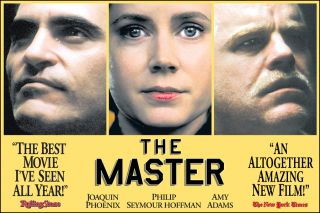Psychoanalysis
A Psychoanalytic Look at ‘The Master’
Quelling feelings: Good idea or not?
Posted May 17, 2013

I want to thank my friend and colleague, guest blogger and psychoanalyst, Dr. Sandra Fenster, for an insightful look at a fascinating film...
Paul Thomas Anderson’s ‘The Master’ is a complex movie about a complex subject. With Lawrence Wright’s Scientology expose, Going Clear, recently capturing the public eye, ‘The Master’ gives us an opportunity to consider the appeal of a system claiming to ‘clear’ people of supposedly negative feelings, as well as the deceptive methods imposed. Although I don’t buy Anderson’s claim that the movie is only loosely based on Scientology, I do agree that ‘The Master’s’ focus on the relationship between Freddie Quell (Joaquin Phoenix) and The Master (Philip Seymour Hoffman) is the essential thing—and this relationship helps to answer some of the questions the film raises. How does someone become vulnerable to a cult-leader like The Master? And, what leads another to become The Master—taking such absolute, omniscient, and sadistic control over other people’s minds? What’s in it for him?
The Master can’t face himself, but he doesn’t know it. He believes he’s above the others with their unsettled pasts. Freddie, though, is a different story. Freddie is just too familiar, too much like him, and The Master has an almost impossible time escaping what he sees, drawn to Freddie at one moment, and sadistically controlling him the next. What both The Master and Freddie are desperately looking for is captured in Freddie’s last name: Quell, a way to put a stop to seemingly ‘bad’ feelings—feelings like Freddie’s.

Freddie is lonely, so intolerably sad he’s driven to rages; love-starved; sex-driven, terrified of the pain of love and real feelings; so that, in the end, all he has is a self-created sand woman. The film’s nuances lead us to believe The Master has these problems too. Freddie has his ‘potion’ (compelled to drink to hide his secrets). The Master’s ‘potion’ is his power over other people— ‘to subdue, crush, quash, put down, repress, control, or defeat’—memories, difficult feelings, and the past. They have to believe these methods work. But, do they? If they did, Freddie wouldn’t fall under The Master’s spell, and The Master wouldn’t have such an obsession to conquer Freddie.
Both Freddie and The Master are afraid, afraid of facing their real feelings. The Master may not look afraid, but he is. So are his subjects. We see this fear, I think, in the basic philosophy of ‘The Cause’: “Man is not an animal. You are NOT ruled by your emotions… we do away with all negative emotional impulses … everyman back to his inherent state of PERFECT… Put the dragon on a leash; next, teach it to roll over and play dead”. There is some truth to not being ruled by your emotions. But, ‘perfect’, according to The Master’s system is to deaden all reactions, feelings, and needs—which the “Go Roving” song displays so well.

‘Perfectly deadened’ is a state The Master has been unsuccessful in imposing on himself, or his devotees for that matter. Any challenge, question, or doubt evokes suspicion and self-righteous aggression; evidence that believing you can quash your emotional reactions is to live under constant threat that the unwanted feelings will return—as The Master is ultimately faced with his Freddie. His suggestive refrain tells us quite a lot: “I’d like to get you on a Slow Boat to China … all to myself alone …melting your heart of stone”. Perhaps he is unable to accept his failure to control Freddie. But, more importantly, this song, strangely homoerotic, is a haunting longing for a lost part of The Master, himself; all the feelings and desires he can’t open his own heart to.
The reality is there are no negative feelings; only those that are misunderstood, frightening, overwhelming, or misdirected. Trying to conquer, crush, or defeat them only forces you to live a lie as Freddie and The Master do. What then? Do you turn to ‘The Cause’s’ methods—methods designed to turn your heart to stone? Or, do you choose a kind of help that, instead, melts your stony heart and gives you a way to live honestly, courageously, and fully with those seemingly ‘negative’ feelings? The film, ‘The Master’, leaves us with that most essential question —and from my many years of clinical experience I know the answer. The Cause’s type of mind control is a supposed ‘cure’ that is, at best, equivalent if not actually worse than the original problem itself.
Copyright 2013 by Sandra Fenster, Ph.D.
Like it! Re-post it! Tweet it! Comment on it!
To learn more about Dr. Fenster, visit her website at www.drsandrafenster.com


